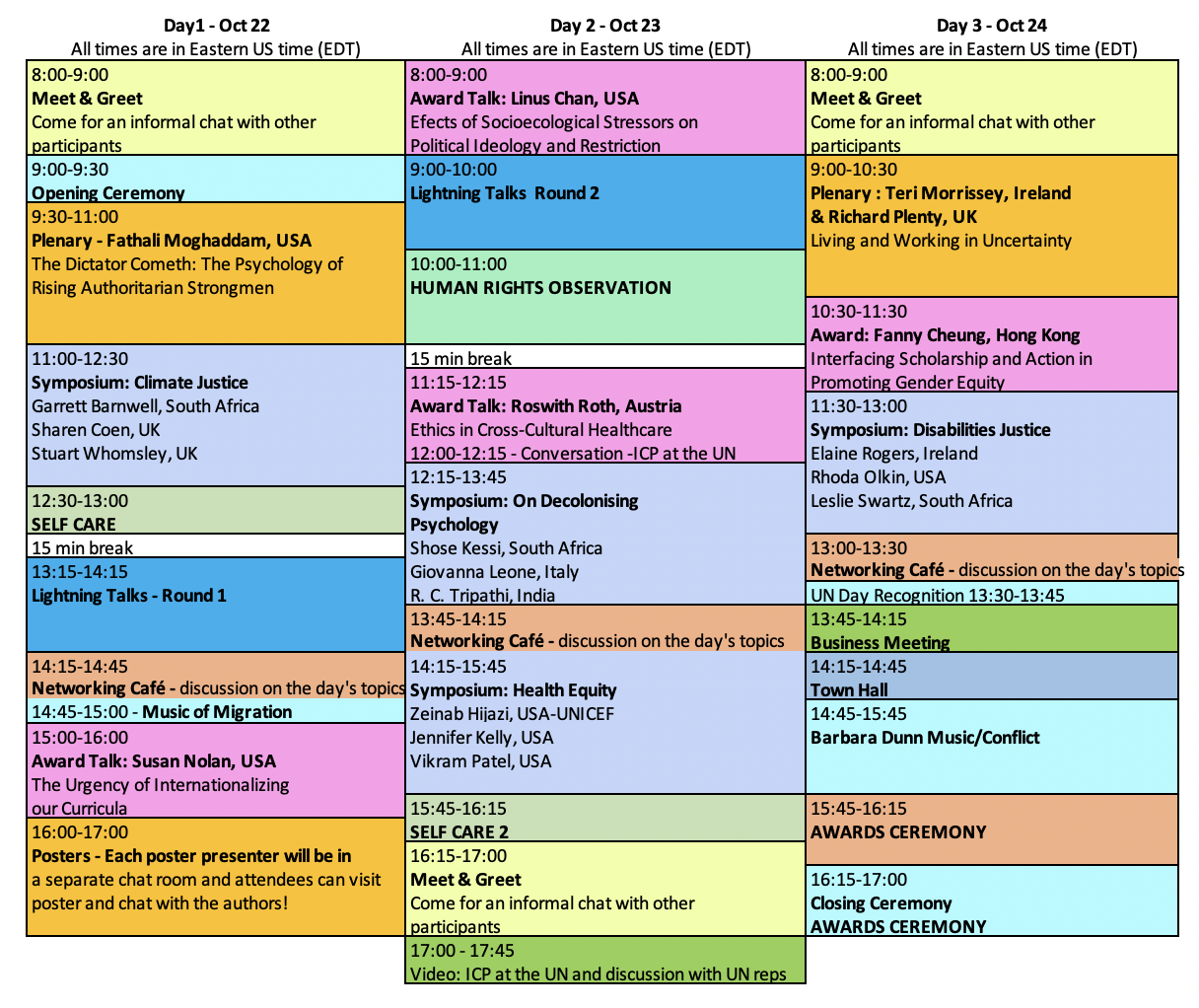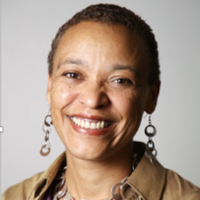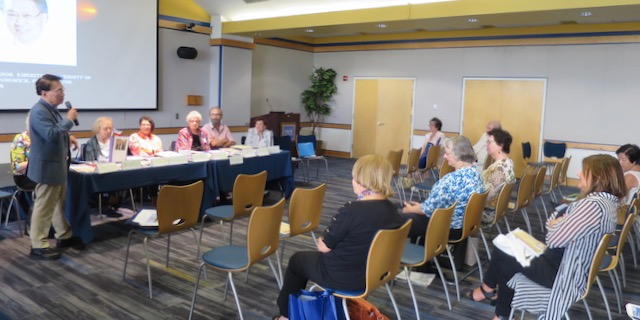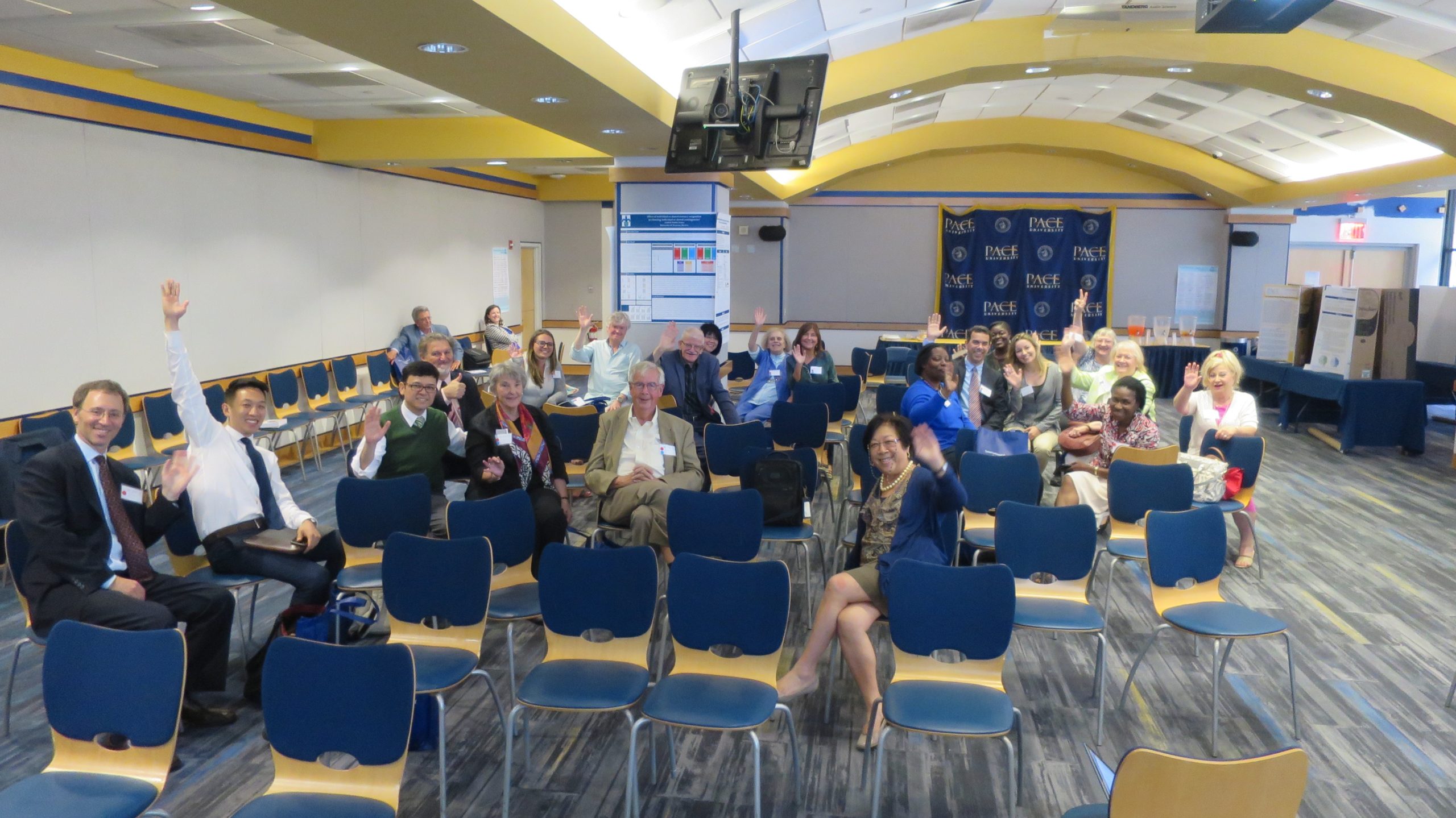
ICP 2021 – October 22-24, 2021
Program Overview

Detailed Online Program: https://www.conftool.org/icp2021/sessions.php
Plenaries

The Dictator Cometh: The Psychology of Rising Authoritarian Strongmen
Fathali Moghaddam, Georgetown University, USA
The 21st century has witnessed a decline in democracy and a rise in authoritarian strongmen, in countries as varied as Russia, Venezuela, Brazil, India, Turkey, China, and the United States. On January 6, 2021, Donald Trump almost succeeded in carrying out a coup to overturn the legitimate Presidential election of Joe Biden. I examine the psychological processes that underlie these worrying trends, with reference to the Springboard Model of dictatorship, and rising perceived threat and its relationship with a decline in support for the open society.
Program materials for participants – download here

Living and Working in Uncertainty
Terri Morrissey and Richard Plenty, THISIS, Ireland/UK
We live in a world of uncertainty. Dealing with it requires a combination of logic, intuition, resilience and self awarenss. To do it well we also need the ability to think critically and have the courage to try things out. In this talk we explore the psychological strategies and the competences needed to navigate our way and, we introduce our model for living and working with uncertianty – The Richmor Model.
Award Talks

The Urgency of Internationalizing Our Curricula: A USA Perspective
Susan Nolan, PhD (2020 Fukuhara Award Recipient)
Seton Hall University, USA
This presentation will explore the internationalization of curricula to develop global citizenship among students. We must pay attention to whose voices are heard within psychological science – with respect to samples, researchers, and gatekeepers. Susan will explore both content and pedagogy that instructors might consider when designing more inclusive courses.

Ethics in Cross-Cultural Healthcare
Roswith Roth, PhD (ICP 2020 Frances Mullen Award Recipient)
Graz University, Austria
The aim of an international survey was the issue whether physiotherapists learn about the moral code of conduct, ethical reasoning and decision making during their basic education. The results showed big differences around the world. It is crucial to assess and reflect the manner of teaching ethics and cross-cultural competences
![FMCheung[1] FMCheung[1]](https://icpweb.org/wp-content/uploads/2020/12/FMCheung1-200x200.jpg)
Interfacing Scholarship and Action in Promoting Gender Equality
Fannie Cheung, PhD (ICP 2020 Denmark-Gunvald Award Recipient)
Chinese University of Hong Kong, Emeritus
During my serendipitous journey of becoming a feminist psychologist, I have capitalized on opportunities to promote gender research while advocating gender equality. Challenges faced by women I encountered have informed my research and initiatives to establish the research infrastructure. Gender research and action were intertwined throughout this journey.

Latent Psychological Hazards of Living in a Volatile Environment: Effects of Socioecological Stressors on Political Ideology and Political Restriction
Linus Chan (ICP 2020 Sukemune/Bain Award Recipient)
University of Montana, USA
Invited Symposia
Health Equity – Moderator Mary Beth Kenkel, USA
![Kelly_5950 social media-final[26] Jennifer Kelly, USA](https://icpweb.org/wp-content/uploads/2021/06/Kelly_5950-social-media-final26-200x200.png)
Psychology’s Role in Achieving Health Equity: A Global Perspective
Jennifer F. Kelly, President, American Psychological Association, USA
Health disparities are preventable differences in the burden of disease, injury, violence, or opportunities to achieve optimal health experienced by socially disadvantaged populations. These systematic and avoidable differences are intensified by political, economic, and social influences. This presentation will address the contribution that psychology can offer in achieving health equity.

Child and Adolescent Mental Health & Wellbeing
Zeinab Hijazi, Senior Mental Health Technical Advisor. UNICEF NYHQ
The serious gaps that exist in mental health care are a result of historic under-investment in, and lack of action on, the promotion of positive mental health, and the prevention among, and care for, children, adolescents, and caregivers with mental health problems. Dr. Hijazi will present UNICEF’s dimensional and life course approach to mental health of children which balances treatment with promotion of mental health and prevention of mental disorder; reframing mental health as an asset along a continuum to help us understand the many entry points – including the importance of promotion and prevention aspects of mental health.

Reaching the Last Mile: Scaling Up Psychological Therapies Globally
Vikram Patel, Department of Global Health and Social Medicine at Harvard Medical School, USA
This lecture will describe innovations to improve the access to evidence informed psychological therapies globally.
Climate Justice – Moderator Erinn Cameron, USA/Scotland

Decoloniality, Epistemic (In)Justice and Climate Psychology: Views From Below
Garrett Barnwell, University of Johannesburg, South Africa
By drawing attention to the coloniality underpinning climate change, I argue that psychologists are able to resituate themselves more meaningfully in relation to global social struggles that seek not only to avert the climate crises but to address climate/coloniality. This decolonial option is fundamental for the flourishing of a pluriversal world.

Climate Justice and Survival – Lessons learned from the COVID-19 crisis
Sharon Coen, Salford University, UK
Drawing on the COVID-19 crisis, we argue that Survival is an Hegemonic Social Representation, a matrix whose elements are dynamically defined and constructed by different groups. The definition and establishment of the elements of the matrix could be key to whether actions promoting climate justice are supported and implemented.

Five Roles For Psychologists In Addressing Climate Change, And How They Are Informed By Responses To The COVID-19 Outbreak
Stuart Whomsley, National Health Service, UK
Five areas where psychologists can help address climate change are: (1) Changing behaviors causing climate change. (2) Increasing human connection with nature (3) Advising leadership for planet protecting good governance. (4) Psychological interventions for those affected. (5) Preparing for bad outcomes. Responses to COVID-19) give insights for climate change responses.
Decolonising Psychology – Moderator Polli Hagenaars, Netherlands

Psychology and Pan-Africanism in Decolonial Times
Shose Kessi, University of CapeTown, South Africa
This presentation traces some key moments in the development of psychology as a discipline that has been both implicated in and resistant to forms of oppression and inferiorization across the globe and how a Pan-African lens to psychological research may contribute to the decolonial turn in the social sciences.

European physical environments still show material traces of times when colonial domination was accepted by most colonizer societies.Today, when societies are facing the challenge of welcoming cultural diversity as a fundamental new feature of civic competence, important social and psychological issues arise on how to cope with these material traces of colonialism. The role of psychological research in providing theoretical insight and practical advice is discussed.

Decolonizing Psychology In Developing Societies
R. C. Tripathi, Alhallabad University, India
Developing societies are often characterized as valuing ‘relatedness’ compared with privileging individual achievements. In most developing societies of the East, cultural knowledge is used to construct ‘relational selves’ that contrast with the “othering” imposed by coloniation. Psychologists in developing societies need to develop ‘glocal’ psychologies, incude construction of ‘local universals’.
Disabilities Justice – Moderator Natalie Porter, USA

Seen, Unseen and Seldom Heard
Elaine Rogers
Limerick University, Ireland
Disabled people are over-represented in less favourable social environments, under-represented in valued environments, and have reduced participation in decision making. This talk will consider this claim and reflect on some of the ways that psychologists can support disabled people.

Rethinking Disability Research: Moving the field forward
Rhoda Olkin
California School of Professional Psychology, USA
Despite important disability laws there are no changes in implicit attitudes toward disabled persons. To address this core issue we need research that informs a more widespread societal approach to improving conditions for disabled people. This talk focuses on specific suggestions for researchers and clinicians to move disability justice forward.

Disability, Invisibility, and the Unfinished Work of Transformation
Leslie Swartz
Stellenbosch University, South Africa
Despite a constitutional commitment to disability inclusion in South Africa, people with disabilities are left behind and subject to abuse and even death. I suggest reasons for continuing exclusion. My particular emphasis is on the politics of inclusion and vulnerability in tight of race and class struggles.

Lightning Talks
- Centering Disability Justice in Supervisory Practices: Exploring Barriers to Disability Competencies in Supervision
- Conflict, Access to Healthcare, and Healthy Child Development Across Countries
- Decolonizing Psychological Statistics
- Decolonizing Psychological Statistics Courses
- Disability Justice: Dismantling Ableist Practices in the Field of Psychology
- Eco-anxiety and youth: A scoping review
- Indigenizing Psychology in Ghana: Witchcraft and Violence Against Women
- Interactions Between Demographic Characteristics, Loneliness And Psychological Wellbing Of Old People In South Africa
- #MaskMadness: Implications of Mask Wearing Stigma on Mental Wellbeing in a Polarized Political Climate
- Rising Waters: Understanding the Impact of Climate Change on Coastal Native Americans and Indigenous Peoples
- The Association between Social Support and Cardiovascular Health
- The Psychological Percussion of Covid-19 on Indian Frontline Warriors
- Violence Against Women and Female Incarceration Rates Predict Estimated Prevalence Of Modern Slavery Across Countries

Poster Sessions –
Poster authors will have an opportunity to meet with poster session attendees in chat rooms for discussion
- Awareness of Racism, Stress, and Belongingness among East-Asian American Emerging Adults
- Conceptualizing Bullying That Targets Asian Adolescents in North American Schools amid COVID-1
- Inequity of Mental Health Care for International Students in Canada During the COVID-19 Pandemic
- Recognizing the Role of Environmental Racism and Justice in the Climate Justice Conversation
- Understanding the History of Psychology
- Youth Homelessness In A Canadian Pandemic Recovery Landscape

Human Rights Observation and Celebration
- Displaced Persons Awareness
- Collective Reading of the Universal Declaration of Human Rights
- Readings, Music, Poetry

Awards and Tributes Ceremony
- Presentation of 2021 Awards
- Presentation of ICP2021 Poster Contest / Lightning Talk Award Recipients

Special Sessions
- Music and conflict
Self-Care Sessions
- Creative Imagery and Dialoguing with Concerns and Feelings
- Guided Meditation

ICP Town Hall / Members’ Meeting
- where is ICP now and where should it be going?
